biometric surveillance
Filter by...
-

Biometric surveillance in the Czech Republic: the Ministry of the Interior is trying to circumvent the Artificial Intelligence Act
EDRi-member Iuridicum Remedium draws attention to the way biometric surveillance at airports should be legalised in the Czech Republic. According to the proposal, virtually anyone could become a person under surveillance. Moreover, surveillance could be extended from airports to other public spaces.
Read more
-

How to fight Biometric Mass Surveillance after the AI Act: A legal and practical guide
The EU's Artificial Intelligence Act has been adopted, laying out an in-principle ban on live mass facial recognition and other public biometric surveillance by police. Yet the wide exceptions to this ban may pave the way to legitimise the use of these systems. This living guide, for civil society organisations, communities and activists, charts a human rights-based approach for how to keep resisting biometric mass surveillance practices now and in the future
Read more
-
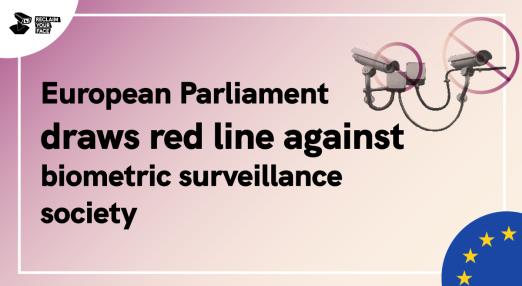
European Parliament draws red line against biometric surveillance society
On Wednesday 14 June 2023, the European Parliament voted to ban most public mass surveillance uses of biometric systems. This is the biggest achievement to date for the eighty organisations and quarter of a million people who have supported the Reclaim Your Face campaign's demand to end biometric mass surveillance (BMS) in Europe.
Read more
-
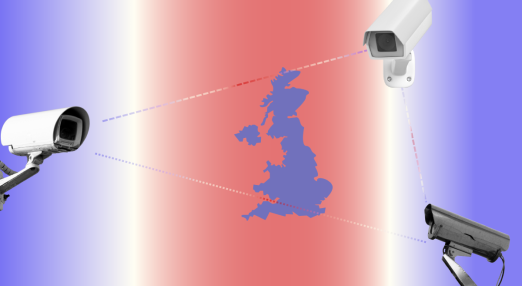
Update: UK’s Online Safety Bill heralds a trio of surveillance
The UK’s Online Safety Bill was back in the Westminster Parliament in December It had been stalled for five months whilst the new British government made a few changes. A Parliamentary debate on Monday (5 December 2022) revealed the shift in policy direction for the first time. It’s a relatively small change with big implications. Read more about the changes.
Read more
-
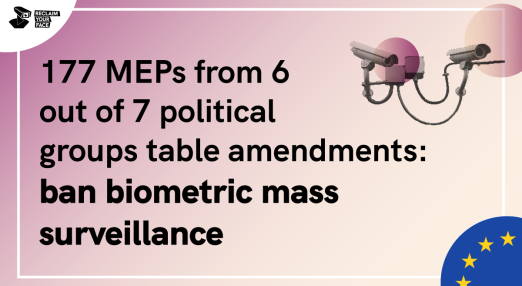
European Parliament calls loud and clear for a ban on biometric mass surveillance in AI Act
After our timely advocacy actions with over 70 organisations, the amendments to the IMCO - LIBE Committee Report for the Artificial Intelligence Act clearly state the need for a ban on Remote Biometric Identification. In fact, 24 individual MEPs representing 158 MEPs, demand a complete ban on biometric mass surveillance practices. Now we need to keep up the pressure at European and national levels to ensure that when the AI Act is officially passed, likely in 2023 or 2024, it bans biometric mass surveillance.
Read more
-
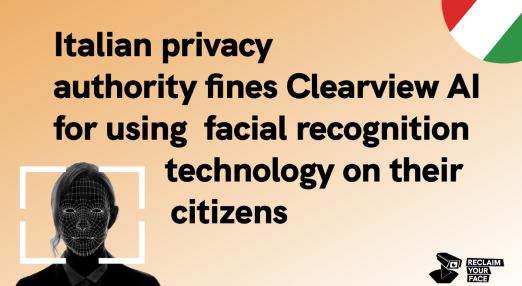
Italian DPA fines Clearview AI for illegally monitoring and processing biometric data of Italian citizens
On 9 March 2022, the Italian Data Protection Authority fined the US-based facial recognition company Clearview AI EUR 20 million after finding that the company monitored and processed biometric data of individuals on Italian territory without a legal basis. The fine is the highest expected according to the General Data Protection Regulation, and it was motivated by a complaint sent by the Hermes Centre in May 2021 in a joint action with EDRi members Privacy International, noyb, and Homo Digitalis—in addition to complaints sent by some individuals and to a series of investigations launched in the wake of the 2020 revelations of Clearview AI business practices.
Read more
-

New RESOURCE PAGE helps supporters BAN biometric mass surveillance
The Reclaim Your Face collective has put together a brand new Resource Page, helping all activists spread the word and take action easily, online, offline – at all times, wherever they are.
Read more
-

Do no harm? How the case of Afghanistan sheds light on the dark practice of biometric intervention
In August 2021, as US military forces exited Afghanistan, the Taliban seized facial recognition systems, highlighting just how a failure to protect people’s privacy can tangibly threaten their physical safety and human rights. Far from being good tools which fell into the wrong hands, the very existence of these systems is part of broader structures of data extraction and exploitation spanning continents and centuries, with a history wrapped up in imperialism, colonialism and control.
Read more
-

Big brother at the Prague airport. The state refuses to explain how the biometric camera system works
When Václav Mach, collaborator of the Czech digital-legal organization, an EDRi member, Iuridicum Remedium (IuRe) and law student at the University of Olomouc, asked the state for more detailed information on the use of smart biometric cameras at Prague's Václav Havel Airport, he obtained just general phrases. "They kept secret what they could. Their non-transparency doesn’t add to their credibility,“ he says in an interview with HlídacíPes.org. The article below is a summary of the more extensive interview, translated from Czech into English by EDRi member IuRe.
Read more
-

EDRi urges Portugal government to oppose proposed video surveillance law
EDRi member and Reclaim Your Face lead organisation D3 (Defesa Dos Direitos Digitais) are raising awareness of how the Portuguese government’s new proposed video surveillance and facial recognition law – which Ministers are trying to rush through the Parliament - amounts to illiberal biometric mass surveillance. It also endangers the very foundations of democracy on which the Republic of Portugal rests.
Read more
-
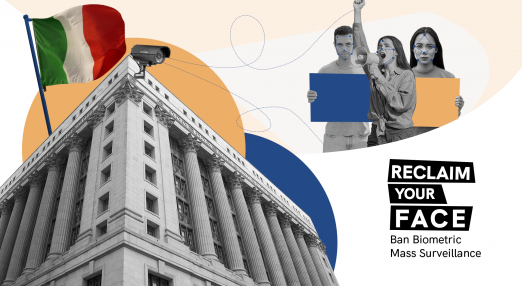
No place for emotion recognition technologies in Italian museums
An Italian museum trials emotion recognition systems, despite the practice being heavily criticised by data protection authorities, scholars and civil society. The ShareArt system collects, among others, age, gender and emotions of people. EDRi member Hermes Center called the DPA for an investigation.
Read more
-
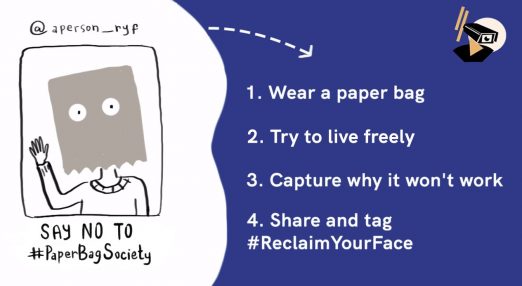
The #PaperBagSociety challenge
The #PaperBagSociety is a social media challenge part of the #ReclaimYourFace campaign that invites everyone to share online the impact of living life with a paperbag on the head. With it, we aim to raise awareness of how ridiculous is to avoid facial recognition technologies in public spaces and why we need to build an alternative future, free from biometric mass surveillance.
Read more
